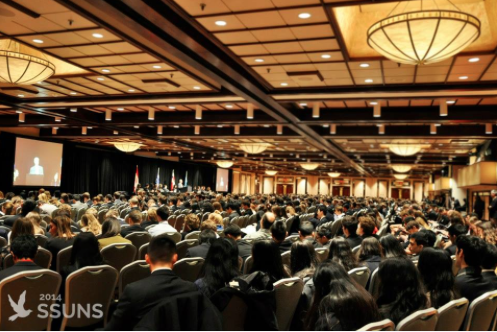One of the biggest challenges for a Model UN club is to decide what conferences they want to attend. One thing that all clubs have in common is that they want to create the best experience possible for their team and meeting the team’s goals. Here are four factors to consider when picking a conference to ensure that your students enjoy their time and grow as people, as scholars, and as delegates.

Opening Ceremonies Photo Credit: Stephanie He and Sam Gregory Photography, and the SSUNS Media Team
1. Values
Every conference has their own unique set of values and ideologies. Some conferences place the greatest emphasis on the educational aspects of MUN, while others value the competitive aspects and still, others value the social and entertainment aspect. Even within these broad categories, there are stark differences: a competitive conference may value research and accurate representation of country policy while another may weigh public speaking and leadership skills more heavily.To identify a conferences core principles, start by reading through the website, especially their mission statement and policies. Some conferences explicitly state that they are non-competitive or do not give out awards. In contrast, a conference which dedicates extensive time to explain their awards policy and delegation award calculation methods in detail probably has a more competition oriented environment. During this investigation, pay attention to their rules of procedure as some conferences have different styles. Make sure your delegates are used to the style of the conference you choose to attend. After skimming the website, feel free to reach out to the secretariat to clarify any questions you may have. They are more than happy to help you out! Once you have established the overarching values of the conference, look at the committees they offer. Is the conference heavily crisis oriented? Are the committees single or double delegation? Make sure that these factors work for your team. If your team has no one willing to do crisis, then a conference which emphasizes its crises committees may not be a great idea. Ultimately, try and pick the conference whose values align most closely with your MUN organization. (A bonus section at the end of this article details how to decide on the focus of your MUN team if it is not already established.)
2. Size and Caliber
As a general rule, larger conferences are more intense, more difficult and more demanding. The size and caliber of the conference you want to attend may change for each trip. Some schools like taking selective teams comprised of their top delegates to highly competitive conferences with the goal of winning delegation awards, while taking teams comprised of newer, inexperienced delegates to smaller, more regional conferences in order to train them for the future. Keep in mind that taking highly skilled delegates to small, low-tier conferences, can overwhelm the inexperienced staff creating an unpleasant experience for all involved. The other side is also true: a delegate just beginning to grasp parliamentary procedure will likely gain very little by being tossed into a 300-person General Assembly where they are aggressively swamped by very competitive delegates. Consider the overall skill and experience of your delegates and ensure that it is appropriate for the conference you choose to attend.
3. Cost
Make sure you have the funds to cover the costs or that students are capable of paying for themselves. When calculating the cost, remember to factor in not only the conference fees but also lodging, travel, and food. Some conferences have deals with hotels for reduced rates or meal plans. Picking at least some conferences close to you should reduce travel costs. Picking a roster that is not exorbitantly expensive is vital to ensure delegate attendance. Please check out our other articles on fundraising for ideas.
4. Distance
As mentioned above, distance impacts the cost but it also has subtler effects. From personal experience, I can testify that long-distance travel for MUN is quite tiring; it’s far easier to recover after returning from nearby conferences. Distance also affects travel time which may cut into the school day. Although most national MUN conferences will have cause you to miss school, reducing the travel time can reduce the amount of time missed. Picking a conference is no easy task! It requires a careful consideration of the factors above as well as circumstances specific to your case. Know that every conference has something unique to offer, and there is an unbelievable variety to choose from. If you need more help, refer to our conference database containing a list of conferences across the world.
Bonus: Competitive or Educational
So which one is right for you and your team? Several school districts and schools have set expectations for their team and may require the program to have an educational focus. Other schools provide flexibility in this regard. If you find yourself having to decide, remember that neither educational or competitive MUN is superior. Consider a recreational jogging and professional track and field, one activity is not inherently better, they are simply different approaches to an activity. Educational conferences help students broaden their perspectives and learn more about pressing world issues and teach students how to collaborate and compromise; competitive conferences develop research, leadership and communication skills. Regardless of your decision, you will find a wide variety of conferences to meet your needs.

